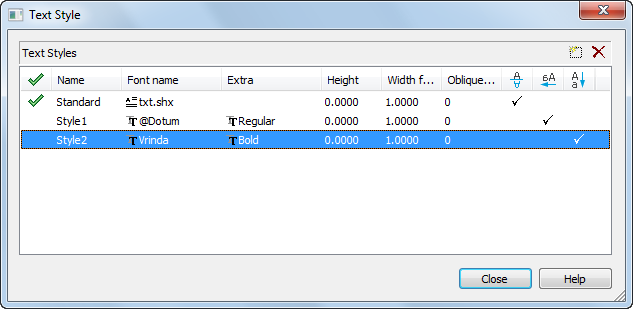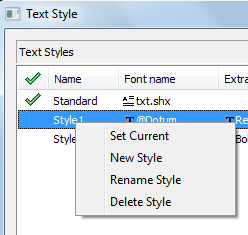Creating a text style









The text style is a convenient tool that creates text objects using different fonts, font size, oblique angle, orientation, and other text characteristics.
You can create and use several text styles in one drawing. Each text object in the drawing is created using the current text style. If you want to create text using a different text style, you can make another text style current.
Except for the default Standard text style, you must create any text style that you want to use.
You can modify an existing text style in the Text Style dialog box by changing the settings.
A text style name can be up to 255 characters long. It can contain letters, numbers, and the special characters: dollar sign ($), hyphen (-), and underscore (_).
By default, the text styles are automatically named Style1, Style2, Style3, etc.
Created text styles are saved with the drawing file.
You can remove unused text styles from your drawing by deleting them from the Text Style dialog box or with the Purge command (the File menu – Drawing Utilities).
NOTE: The Standard text style cannot be removed.
(marker-gray) NOTE! Changing the Upside Down and Backwards options has no effect on multiline text objects.
The Text Style dialog box allows you to set the current text style, create new text styles, and change the parameters of the existing text styles (imported as a *.dwg or *.dwt files):

Options:
 Add new style Add new style |
Creates a new text style. |
|---|---|
 Delete style Delete style |
Deletes unused text style. |
 Set current Set current |
Sets the selected style as current. |
| Name | Name of text style. |
| Font name | Drop-down list to select the font |
| Extra | Drop-down list to select the text style. The list is empty for shx-fonts. For TTF-fonts the following types are available:
|
| Height | Height of the text. |
| Width factor | Sets the character spacing. Entering a value less than 1.0 condenses the text. Entering a value greater than 1.0 expands it. |
| Oblique angle | Sets the oblique angle of the text. |
 Upside down Upside down |
Turn on/off the mode to display the characters upside down. |
 Backwards Backwards |
Turn on/off the mode to display the characters backwards. |
 Vertical Vertical |
Turn on/off the mode to display the characters aligned vertically. Vertical is only available if the selected font supports dual orientation. |
NOTE: The vector fonts (*.SHX) are marked with S in the Font name list, TrueType-fonts with T.
To create a text style:
1. Select the text style, which the new text style should be based on (the Add new style 
2. Click the Add new style 
3. To rename the created style, double click on the text style name, type the new name and press ENTER.
4. From the drop-down list select the font.
5. Specify the required text options (height, extra, oblique angle, etc.).
6. To set the created text style as the current one, double click in the left field next to the text style. The flag in this box indicates that the style is set as the current one.
7. Click Close to close the dialog box.
Some commands are also available in the context menu by right clicking in the field of the text styles list:

To delete a text style:
1. Select the text style you want to delete (the Delete style 
2. Click the Delete style 
3. Click Close to close the dialog box.
Info: NanoCAD is an easy-to-use, cheap, and yet professional, CAD app for personal computer, that allows a great user experience by providing high performance, full capability, a classic interface and native.dwg format support. nanoCAD has been built to deliver design and project documentation for all industries. nanoCAD includes a full suite of basic and advanced CAD tools for 2D/3D drafting and creating industry-standard DWG-compatible CAD files. Our freeware supports groundbreaking, collaborative and customizable features to boost your efficiency, and includes several API’s, allowing anything from routine task automation to complex CAD software development. You may try nanoCad for free, using the links below, and buy later, if you like it.




Post your comment on this topic.